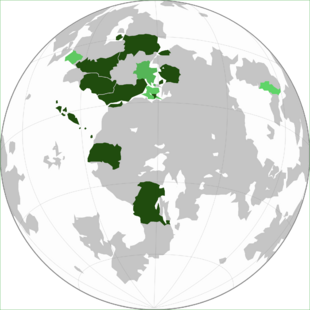Saltstil Pact: Difference between revisions
No edit summary |
(→Goals) |
||
| Line 33: | Line 33: | ||
* Maintain and strengthen the sovereignty of participating states. | * Maintain and strengthen the sovereignty of participating states. | ||
===Institutions | ===Saltstil System=== | ||
The ''Saltstil System'' relates to the principles underpinning the Saltstil Pact and the relations between its member states. Rather than being an enforceable set of rules, the Saltstil System is a series of values that guide policy-making. Six principles, in particular, underpin the Saltstil System:<ref name=": System">[https://i.imgur.com/LJrd3HN.jpg/ "The Saltstil System"]. ''portal.pact.saltstil.org''. Retrieved 9 March 2022</ref> | |||
# '''Non-intervention.''' Members of the Saltstil Pact agree not to intervene in the internal affairs of another state. This means that members do not, as a rule, provide any oversight or monitoring of elections, the rule of law, or other domestic matters. The role of the pact in this regard is limited to enforcing agreements made through the pact that member states are obliged to follow. | |||
# '''Solidarity.''' The Saltstil Pact affirms its primary objective is protecting and promoting eastern interests, and as such emphasises solidarity and co-operation amongst its members and the wider eastern regions. | |||
# '''Intergovernmentalism.''' Activities at a pact level are conducted through member states rather than through the pact's organs. The Saltstil Pact itself does not have the authority to initiate policies or agreements on its own initiative, but rather operates through its member states. | |||
# '''Transparency.''' The organs of the Saltstil Pact are obligated to record and publish minutes from general meetings, and to make public all funding sources and where funding is directed. Specialised meetings on sensitive subjects (such as defence matters) are, however, kept away from public scrutiny. | |||
# '''Unanimity.''' Most agreements are made through the process of unanimity, requiring all members to agree to a proposal for its provisions to be implemented. Only certain specified areas do not operate under this provision. | |||
# '''Peace.''' The Saltstil Pact declares that it promotes peace and international cooperation, with any belligerent actions being made only in response to, rather than to preempt, aggression. The Saltstil Defence Pact is a fundamental part of this pillar. | |||
==Institutions== | |||
{{Center|'''Institutions of the Saltstil Pact'''}} | {{Center|'''Institutions of the Saltstil Pact'''}} | ||
{{clear}} | {{clear}} | ||
Revision as of 12:20, 4 March 2023
| Inter-Oriental Treaty on Cooperation and Development Tratado Interoriental de Cooperación y Desarrollo 協力と開発に関する東洋間条約 | |
|---|---|
 Signatory states in dark green; participating associate states in light green | |
| Signed | TBC |
| Location | Saltstil, Vultesia |
| Effective | TBC |
| Condition | Ratifications of two-thirds of the Signatory States |
| Signatories | 5 |
| Parties | 8 |
| Depositary | Government of the Principate of Vultesia |
| Languages | Common, Vultesian, Spanish, Hoterallian |
The Inter-Oriental Treaty on Cooperation and Development (commonly known as the Saltstil Pact or the Saltstil Treaty, or by the Common-language acronym IOTCD) is an political, economic, and mutual defence treaty signed in Guri, Riamo among several states in Olivacia, Hiraethia, and Meredonne. The treaty, legally binding on signatories, provides for enhanced cooperation in a number of different areas on the basis of intergovernmentalism and national sovereignty.
The treaty created four independent intergovernmental organisations: the Oriental Trade Alliance (OTA), the Eastern Benevolent Fund (EBF), the Oriental Defence Union (ODU), and the Eastern Energy Partnership (EEP). These organisations are separately administered bodies subordinate to the treaty but governed by their own charters. An annual Summit of the Orient, a meeting of participating states' heads of government, determines the overall direction of the pact.
Goals
- Political, economic, cultural, and military cooperation among participating states.
- Promote the resolution of disputes.
- Encourage new ideas and solutions to regional and international problems.
- Facilitate economic growth across the region.
- Maintain and strengthen the sovereignty of participating states.
Saltstil System
The Saltstil System relates to the principles underpinning the Saltstil Pact and the relations between its member states. Rather than being an enforceable set of rules, the Saltstil System is a series of values that guide policy-making. Six principles, in particular, underpin the Saltstil System:[1]
- Non-intervention. Members of the Saltstil Pact agree not to intervene in the internal affairs of another state. This means that members do not, as a rule, provide any oversight or monitoring of elections, the rule of law, or other domestic matters. The role of the pact in this regard is limited to enforcing agreements made through the pact that member states are obliged to follow.
- Solidarity. The Saltstil Pact affirms its primary objective is protecting and promoting eastern interests, and as such emphasises solidarity and co-operation amongst its members and the wider eastern regions.
- Intergovernmentalism. Activities at a pact level are conducted through member states rather than through the pact's organs. The Saltstil Pact itself does not have the authority to initiate policies or agreements on its own initiative, but rather operates through its member states.
- Transparency. The organs of the Saltstil Pact are obligated to record and publish minutes from general meetings, and to make public all funding sources and where funding is directed. Specialised meetings on sensitive subjects (such as defence matters) are, however, kept away from public scrutiny.
- Unanimity. Most agreements are made through the process of unanimity, requiring all members to agree to a proposal for its provisions to be implemented. Only certain specified areas do not operate under this provision.
- Peace. The Saltstil Pact declares that it promotes peace and international cooperation, with any belligerent actions being made only in response to, rather than to preempt, aggression. The Saltstil Defence Pact is a fundamental part of this pillar.
Institutions
| Oriental Trade Alliance — Free trade area — |
Eastern Benevolent Fund — Regional finance institution — |
Eastern Energy Partnership — Energy regulation and integration — |
Oriental Defence Union — Mutual defence pact — | |||
|
|
|
|
Members
Participating states
The Saltstil Pact has eight full parties and two associate parties.
| Party name | Symbols | Parliament | Membership | Membership status | |
|---|---|---|---|---|---|
| Arms | Flag | ||||
| Freice | General Kiuva | Full | Country of Riamo | ||
| Gavrilia | Parliament | Sovereign state | |||
| Anáhuac | Congress | ||||
| Hoterallia | National Diet | ||||
| Riamo | Federal Assembly | ||||
| Vultesia | Principatial Office | ||||
| Wellsenfaile | Parliament | ||||
| Xzavaria | Parliament | ||||
| Zona Umida | Parliament | Associate | |||
| Riojania | Federal Council | ||||
Summit leaders
The following is a list of heads of government in attendance at the Summit of the Orient.
| Party | Name | Title | Since |
|---|---|---|---|
| Kana Tenqel | Head of the Government | 20 January 2023 | |
| Ignacio Castro Cisneros | Prime Minister | ||
| Matías Larrazábal Torres | President | ||
| Kono Takaida | Head of Ministries[a] | 6 December 2022 | |
| Eliza Nunes | Chancellor | 23 February 2022 | |
| Felics Basztyn | First Citizen/Princeps | ||
| Telsruk Haven | Leader | ||
| Josefína Kozłowski | Prime Minister[b] | ||
| Sebastian Michelle | President | ||
| Saúl Gudmann | Poligovernator |
Flag
Each of the four institutions uses a common flag, which features a white stylised depiction of eight parties around a table on a blue field.
See also
References
- ↑ "The Saltstil System". portal.pact.saltstil.org. Retrieved 9 March 2022
Notes
External links


